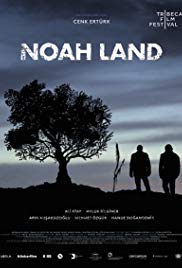Tribeca 2019: "Noah Land" Review
A thoughtful and provoking debut from Cenk Ertürk, “Noah Land” immediately grabs you with a nostalgic score whose auditory familiarity is appropriately somber.
Coming to terms with his terminal illness, Ibrahim (Haluk Bilginer) asks his son Ömer (Ali Atay) to drive him to the village in rural Turkey where he was raised. However, Ömer soon realizes there is an underbelly to this request that slowly surfaces. In short, Ibrahim wants to be buried beneath a tree he planted as a boy. This tree, and more specifically this land, however, had been in dispute which is what cast Ibrahim’s family away from the community years ago. Since, the land has become a holy site of sorts, deemed the “Noah Tree” after the Biblical figure whom the villagers believe first planted it. Ibrahim, adamant of his just burial, must convince his ever-conflicted son for help while he too battles his own demons: a divorce and an insatiable anger brewing out of unaired grievances between himself and his father. Sentimental perhaps, but it is unclear what Ertürk is aiming for with this film. A slow-burning, dry drama that leaves you questioning how you feel about any of it all.
Ertürk uses a conventional color palette nicely throughout, replete with fiery oranges and deep-sea blues. He also uses earth tones as a crutch and the natural beauty of the landscape, for which no one could be faulted. Not as much a conversation piece but more a declaration of fact: rural Turkey is beautiful. Of course, then, Ertürk uses the tree as a central motif to bleed through the photography and color design of the film.
While the score offered a soft blanket to rest on, the sound mixing needed work. Oftentimes too loud, the SFX of breathing felt more like an editing misstep than a creative choice. But the issues didn’t stop there. The film’s problems begin almost immediately, as Ertürk throws the audience into the deep end without explaining how the principal characters connect or even why they act the way they do. Let us begin with the first scene with Ömer and Ibrahim. Ibrahim, sick and elderly, struggles to get out of the car and even more so on his walk into the nearby convenience store. Yet his son, Ömer, not only doesn’t offer to help him, but takes a piece of gum out of his mouth and wedges it into the lock of the passenger side door so that his father must sit in the back. Without the context of their relationship, Ömer’s action appears unnecessarily cruel. Even when we learn more about Ibrahim’s abandonment of Ömer and his mother, it is difficult to sympathize with him.
That being said, as Ibrahim states, “there is a very fine line between revenge and justice,” and Ertürk is using the character to explore that idea. And while Ömer’s relationship with his father is sensibly complicated, it’s his relationship with his ex-wife, Elif (Hande Dogandemir), where things really get muddled. This, of course, is not to discredit the characters themselves because all three actors give incredibly evocative performances. Simply put, Ertürk hasn’t given the audience the means to understand their unique perspectives.
In a thematically driven narrative where metaphor is ubiquitous, it is expected that Ertürk wouldn’t stick every landing. But I’d be doing a disservice to dismiss this film entirely as a failure. It has a plethora of redeeming qualities that would bring me back for a second viewing, including an ending that makes you question—what is it in our dreams that causes us to act in the present? The longer we spend with Ömer and Ibrahim it is clear the apple doesn’t fall too far from the tree, and at its core, this film paints that picture nicely.
Grade: C+



